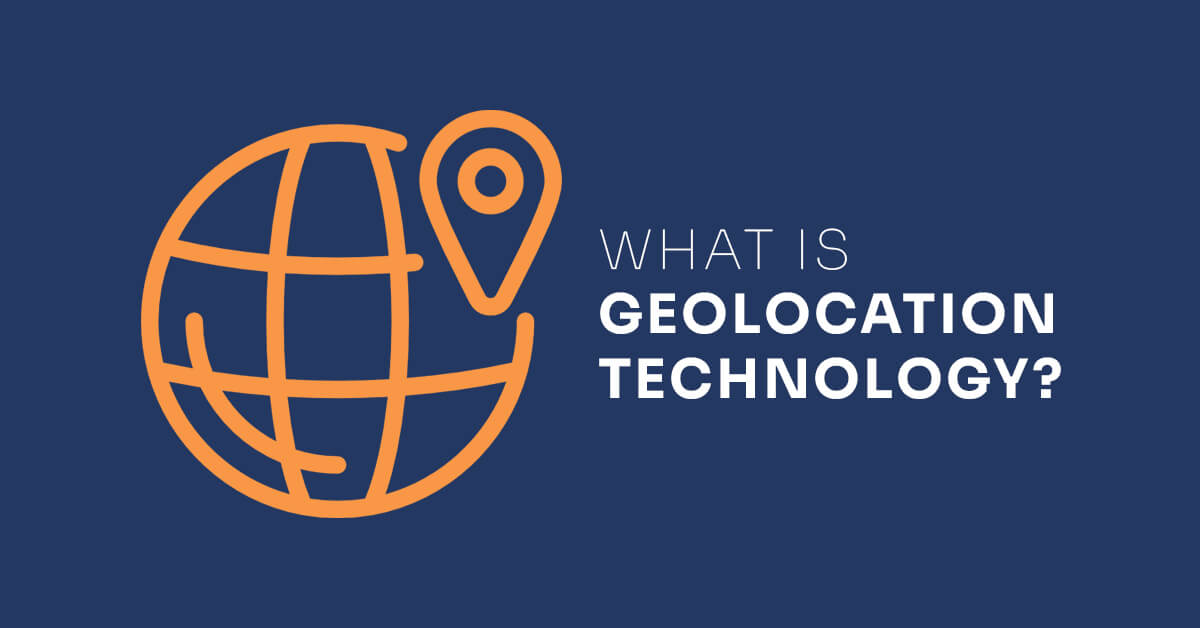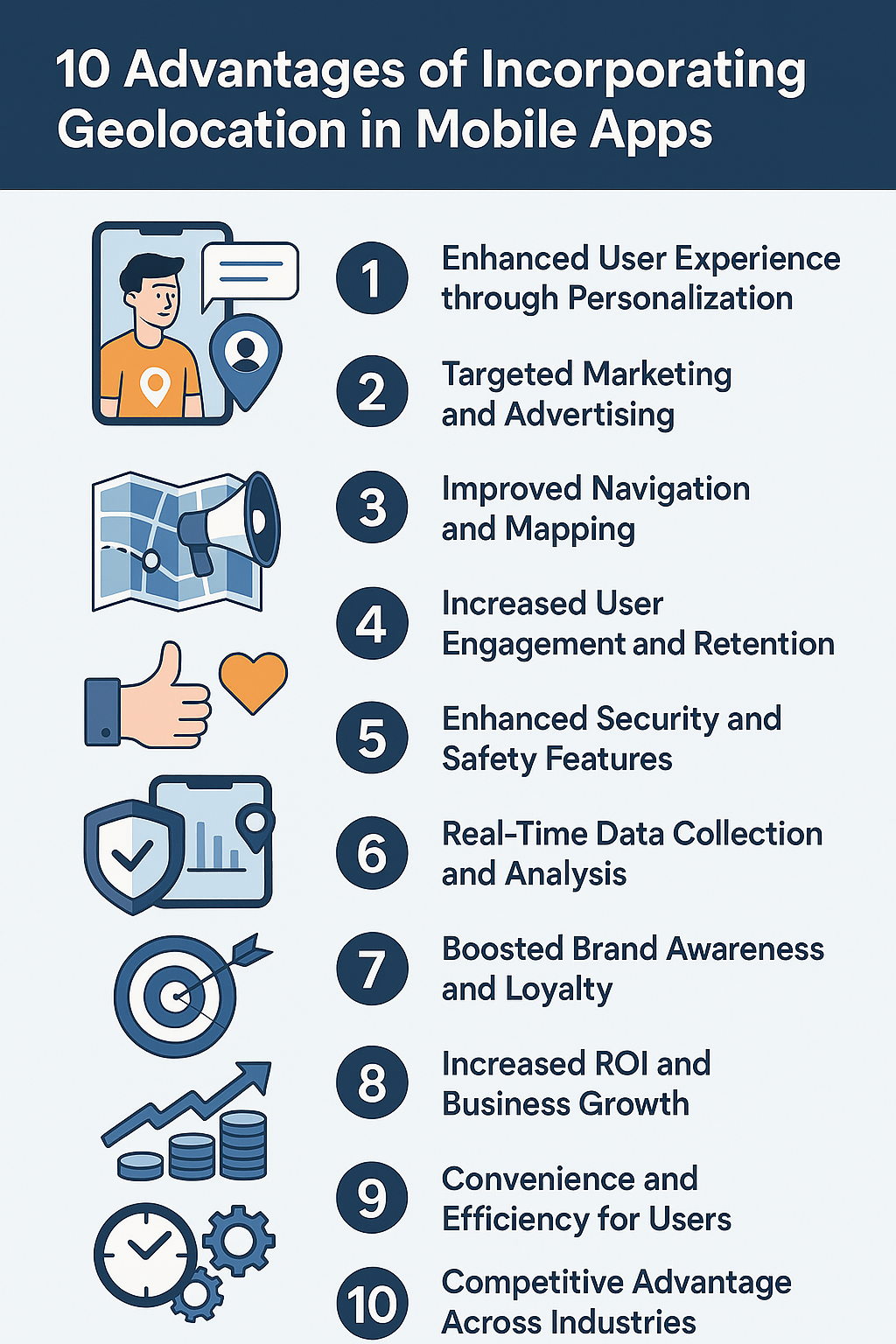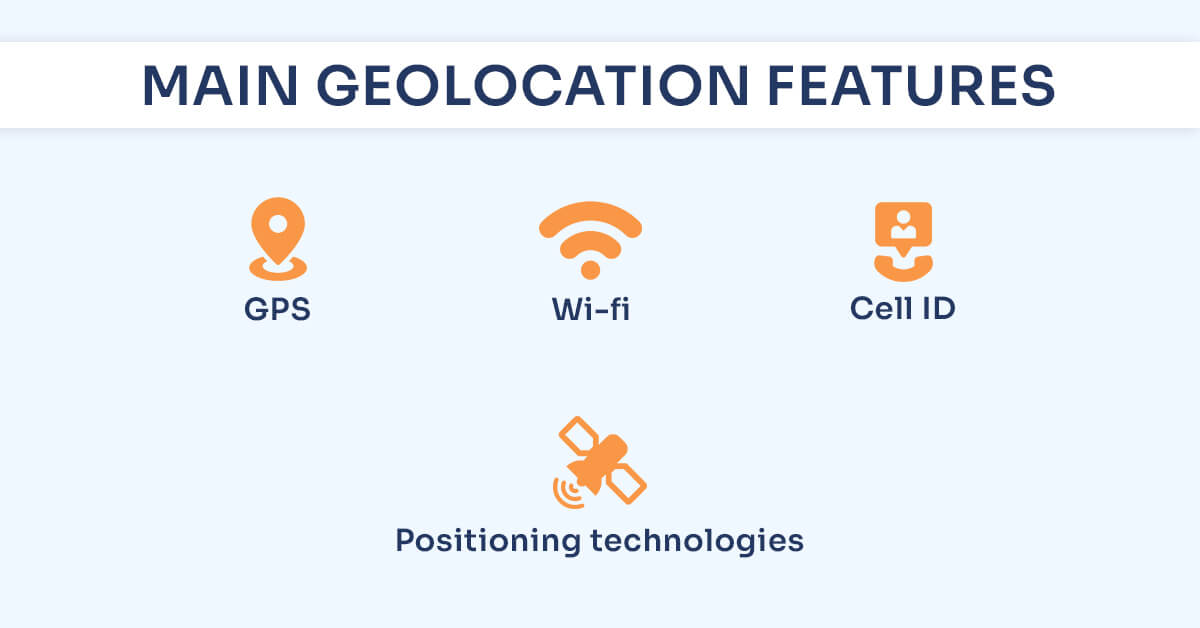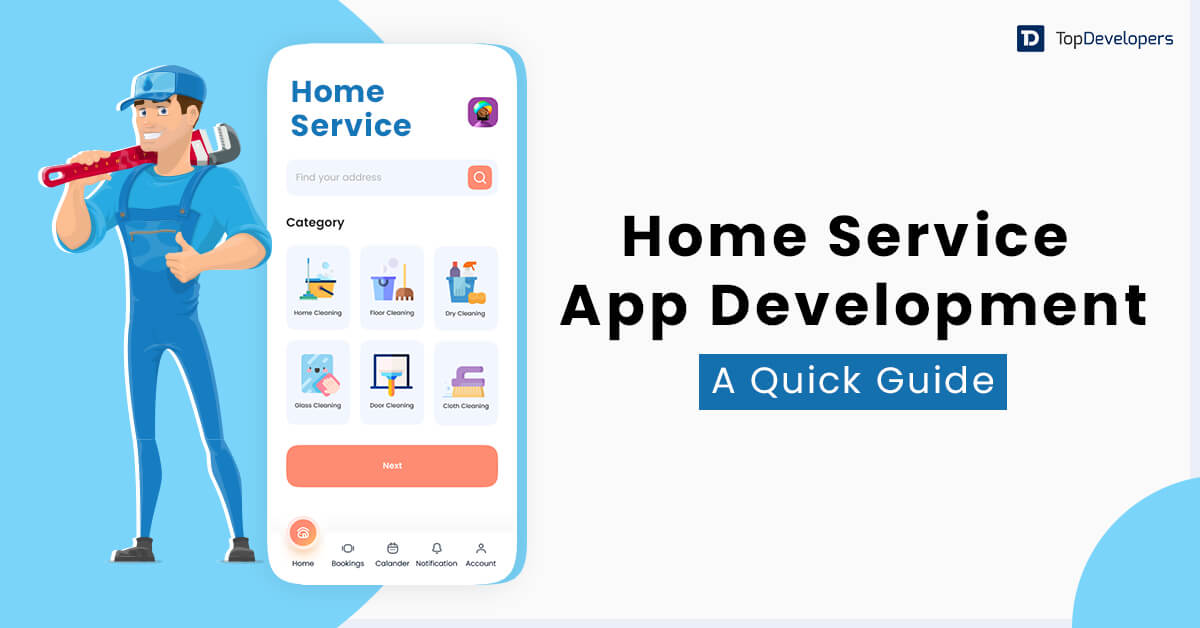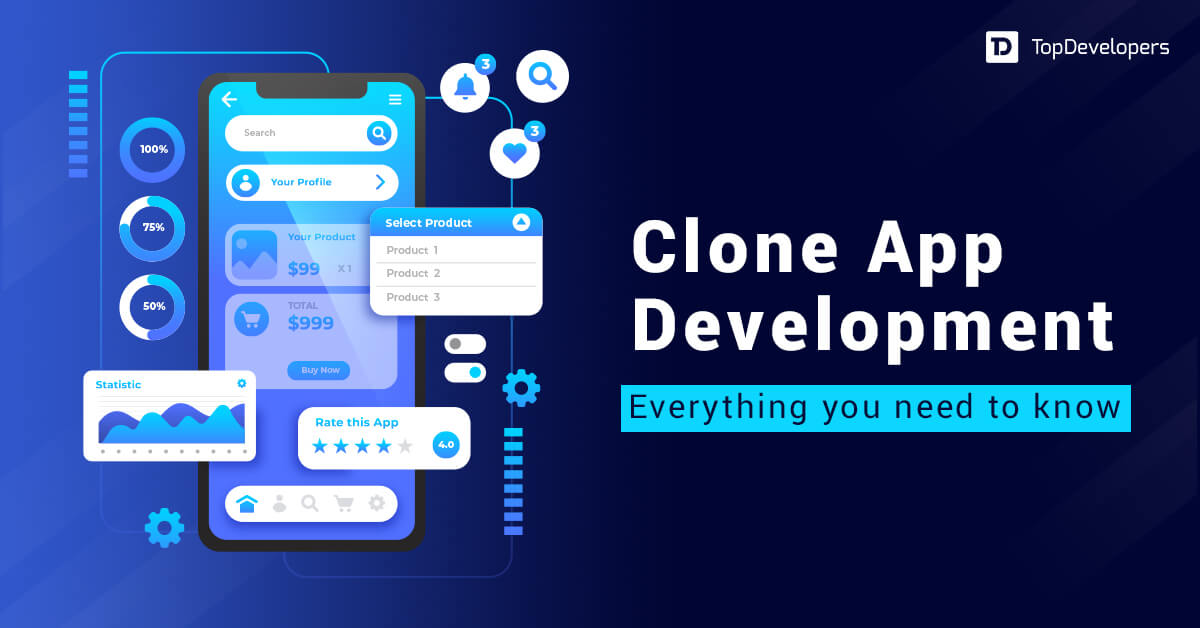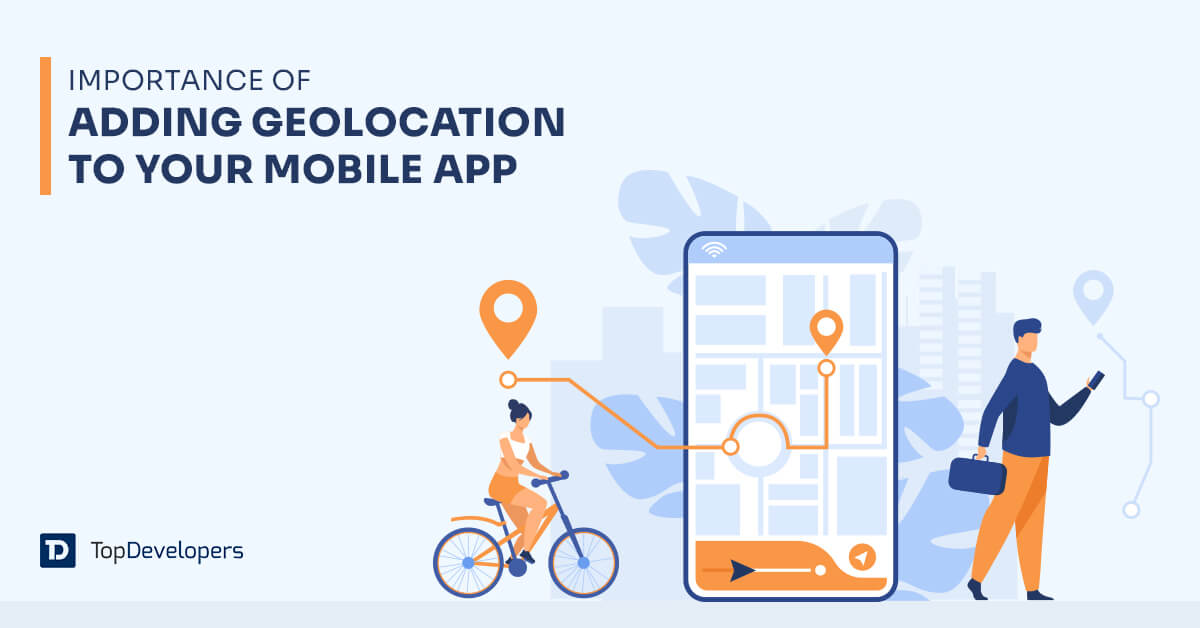
Technological progress in mobile technology has improved the quality of life. New feature releases have helped mobile applications retain current users and boost user acquisition over the previous three decades. Geolocation technology is one of the finest contributions to mobile apps, helping to lower app uninstallation and boost user interaction. Let’s go over it closely.
Table of Contents
- What is geolocation technology?
- 10 Advantages of Incorporating Geolocation in Mobile Apps
- 1. Enhanced User Experience through Personalization
- 2. Targeted Marketing and Advertising
- 3. Improved Navigation and Mapping
- 4. Increased User Engagement and Retention
- 5. Enhanced Security and Safety Features
- 6. Real-Time Data Collection and Analysis
- 7. Boosted Brand Awareness and Loyalty
- 8. Increased ROI and Business Growth
- 9. Convenience and Efficiency for Users
- 10. Competitive Advantage Across Industries
- Which mobile apps are supercharged with geolocation features?
- What are the business benefits of integrating geolocation features in mobile apps?
- How to add this geolocation feature flawlessly in the app?
What is geolocation technology?
Geolocation technology lets consumers locate the device depending on the coordinates and geographic measurements of the location. It entails spotting and distributing the exact position of the digital gadget or other tool. Mobile applications make use of low-power geolocation technologies to track device whereabouts via Bluetooth and Wi-Fi.
The global low-power geolocation market size is expected to reach $100.43 billion by 2027 at a CAGR of 25.4%.
Following the pandemic, 5G networks and smart infrastructure development improved GPS technology use in mobile app development. Other elements influencing the expansion of geolocation technology include the rising security issues, IoT integration, fleet operations, and geolocation area development. The geolocation feature is one of the best mobile app features that most businesses are integrating to innovate their mobile applications.
10 Advantages of Incorporating Geolocation in Mobile Apps
1. Enhanced User Experience through Personalization
Apps using geolocation may provide services catered to a user’s present location, suggestions, and content. This makes the software more relevant and helpful, therefore enhancing its appeal to every person.
2. Targeted Marketing and Advertising
Location data allows apps to provide highly relevant adverts, offers, and promotions depending on where users are. Studies demonstrating significant improvements in revenue from location-based marketing suggest this raises conversion rates and ad efficacy.
3. Improved Navigation and Mapping
Real-time navigation, route optimization, and location searches in applications such as Google Maps, ride-hailing, and delivery services all depend on geolocation. Users get precise location monitoring and instructions.
4. Increased User Engagement and Retention
Location-aware elements, including check-ins, geo-tagged content, and proximity alerts, help applications to be more dynamic and entertaining, therefore motivating users to return and engage more often.
5. Enhanced Security and Safety Features
Geo-fencing, location-based access management, and emergency location monitoring are just a few of the security uses geolocation offers for apps. This guarantees user protection in many different situations and helps stop fraud.
6. Real-Time Data Collection and Analysis
Geolocation lets companies compile important information about consumer behavior, interests, and mobility. Analysis of this information will help to maximize services, enhance targeting, and guide corporate choices.
7. Boosted Brand Awareness and Loyalty
Stronger emotional ties with consumers resulting from location-based elements help boost brand loyalty. Additionally, increasing brand exposure involves interactive elements and social media sharing of the location.
8. Increased ROI and Business Growth
Customized, location-aware experiences increase user involvement and conversions, therefore improving returns on investment and prospects for company growth.
9. Convenience and Efficiency for Users
Geolocation simplifies chores such as locating nearby businesses, real-time delivery monitoring, and quick notifications about local events or offers, therefore optimizing the user experience.
10. Competitive Advantage Across Industries
By allowing creative features and better user experiences that rivals may lack, integrating geolocation provides applications an advantage in many industries—retail, travel, healthcare, gaming, and more.
Which mobile apps are supercharged with geolocation features?
By opening fresh prospects, geolocation technology has given many different industrial sectors many advantages. Companies use technology differently to benefit themselves.
Navigation apps
GPS technology helps location-based applications like travel, taxi, truck, auto sharing, and others. The applications provide optimal paths in real-time based on traffic congestion, road conditions, user locations, and weather data, allowing users to reach their desired areas with minimal effort. Technology is the core of on-demand transportation applications, transforming taxi hiring and booking practices while significantly supporting the international economy.
Delivery apps
Whether food delivery, grocery delivery, laundry, gasoline delivery, or handy personal services, GPS technology is crucial to delivery systems. It helps end consumers monitor goods and services in real-time and know projected delivery timelines and delivery status, just as the service providers do. These delivery companies have boosted revenues and return on investment by countless numbers during the pandemic.
Social apps
Globally, digital connections have been shown to be stronger and more appealing. People are building large groups with related interests thanks to social networking applications such as Facebook, Instagram, LinkedIn, and Twitter. Making this connection smooth depends critically on the geolocation function.
Dating applications, for example, let users locate and meet friends or mates in their chosen places. Local businesses might develop and advertise the brand to sell certain services in a given area. The recommendation applications make use of the social power available to interested individuals to inform them about past client ratings and reviews.
Gaming app
Particularly in augmented reality games that have become well-known in the gaming business, location-based GPS technology is extensively used in games. Pokémon Go, a location-based game, captivated players and garnered millions of downloads. Saying it’s a game that has introduced AR technologies around the globe at scale is not quite hyperbole.
Health and fitness apps
People are utilizing health and fitness applications that let them measure the steps they run or the distance traveled in a day when swimming, walking, or jogging, as developing healthy living standards calls for. Furthermore, in an emergency, the geolocation technology lets users locate pharmacies or hospitals close by.
What are the business benefits of integrating geolocation features in mobile apps?
Collect and analyze data
The GPS connection helps retailers to gather and examine the consumers’ data, including their evolving tastes and interests in the goods and services, every time they visit many franchisees of the brand. We can figure out and plan customized marketing tactics using the geolocation app information.
Deliver a personalized experience
One of the strongest weapons in the toolkit of the business is GPS technology, which provides amazing experiences to increase attraction to consumers. The retail establishments are more eager to purchase when they provide customized offers to their clients depending on past purchases. Strategically employing GPS technology will help retailers maximize the possibilities.
Improve brand awareness
Local businesses are increasingly emphasizing location-based app development, as it will help raise brand exposure. When businesses use GPS-powered applications to message people walking by the shop, those individuals become aware of the brand store and its local products. It enhances the trust and dependability of the brand shop. Establish allegiance.
Build loyalty
Customers who find what they are searching for build a link in their customer relationship. When anything is offered locally, the geolocation applications indicate that it is being taken care of at a small scale. Reduced mistakes, better handling of requests, and customized messaging satisfy the client and make them a brand-devoted follower.
Increased ROI
Recall that the message you got from a brick-and-mortar shop about new arrivals or the best bargains as you passed by the business made you visit the store at least once. GPS technology has a capacity that enables companies to boost foot traffic, revenue, and thus, return on investment.
Connecting online and offline businesses
Geolocation applications would be very helpful for firms with physical storefronts and online presences. The geolocation technology lets consumers mark the company socially when they visit the real shop, therefore boosting the traffic to the actual location.
How to add this geolocation feature flawlessly in the app?
Geolocation technology gathers user location data in many methods for companies.
GPS
Since the global positioning satellites cover the earth, the location of tracking devices is determined by the built-in cellphones that come with the receivers of the global satellite system.
According to Bloomberg, the location-based services market is expected to reach $114 billion by 2026 due to the upsurge in the use of smartphones and GPS.
Wi-fi
Wi-Fi helps in accessing the location accurately, but it’s a daunting task to ensure all the users keep their Wi-Fi on.
Cell ID
Smartphones get signals coming from the linked cellular base stations. Although the base stations assist in obtaining the mobile devices’ geographical locations, their main importance is related to the radio waves.
Positioning technologies
GPS TECHNOLOGY makes it impossible to track the whereabouts within the buildings or supermall properly. Low-power Bluetooth iBeacon, therefore, greatly facilitates constructing navigation via notifications.
Key components of geolocation app development are location service APIs and maps. For example, Apple OS offers an Apple Map Kit to let GPS-powered app creation flourish, whereas Android OS offers Android API and Google Maps.
It shows the API has the required toolkit to enable GPS capability. Geographical coordinates allow the APIs to locate or display devices on the map. Additionally, it is designed to provide custom-location services, like an API showing a list of surrounding eateries, which is the secondary API.
Conclusion
Getting a cell number or physical address of the folks is a chore for an ordinary Joe in the linked digital world. People voluntarily provide their location information in order to be eligible for unique privileges or tailored suggestions, instructions, purchases, listening to music, and others. Companies are beginning to see the advantages of geolocation in mobile applications. The advantages stated in the book would assist companies in places where they may raise their return on investment.
Interested companies may find top mobile app developers to include geolocation technology in their current applications or create a new location-powered mobile app.
FAQs
1. What is geolocation in mobile apps and how does it work?
Geolocation in mobile apps uses GPS, Wi-Fi, cell towers, or IP addresses to determine a user’s physical location. This data helps deliver location-based services such as navigation, local offers, and real-time tracking.
2. What are the main benefits of adding geolocation to a mobile app?
Geolocation enhances user experience by enabling real-time location tracking, targeted marketing, personalized content, local search results, and location-based notifications, which can increase engagement and retention.
3. Which types of mobile apps benefit most from geolocation features?
Geolocation is especially beneficial for ride-sharing, food delivery, fitness, dating, travel, real estate, local services, and on-demand marketplace apps, where location accuracy directly impacts usability and value.
4. How can geolocation improve user engagement and app retention?
By offering features like nearby deals, check-ins, or personalized content based on user location, geolocation makes the app more interactive, relevant, and timely — increasing user satisfaction and encouraging repeat use.
5. Is it difficult to integrate geolocation into a mobile app?
No, most modern development frameworks like React Native, Flutter, and Swift support geolocation APIs, making integration straightforward. Tools like Google Maps API or Mapbox offer reliable, developer-friendly solutions.
 Avantika Shergil
| May 22, 2025
Avantika Shergil
| May 22, 2025
Avantika Shergil is a technology enthusiast and thought leader with deep expertise in software development and web technologies. With over 8 years of experience analyzing and evaluating cutting-edge digital solutions, Avantika has a knack for demystifying complex tech trends. Her insights into modern programming frameworks, system architecture, and web innovation have empowered businesses to make informed decisions in the ever-evolving tech landscape. Avantika is passionate about bridging the gap between technology and business strategy, helping businesses build customized software and website, and understand about different tools to leverage effectively for their ventures. Explore her work for a unique perspective on the future of digital innovation.
